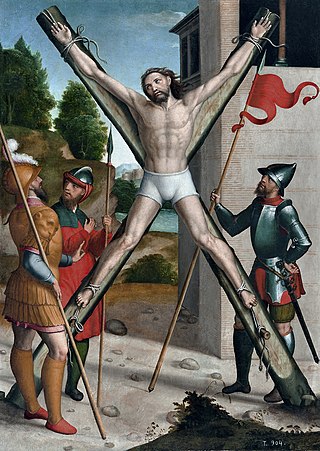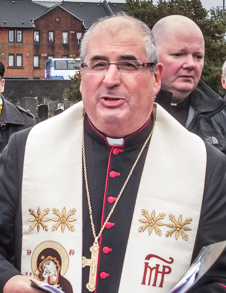
The Church of Scotland is the national church in Scotland.

In Western Christian theology, grace is created by God who gives it as help to one because God desires one to have it, not necessarily because of anything one has done to earn it. It is understood by Western Christians to be a spontaneous gift from God to people – "generous, free and totally unexpected and undeserved" – that takes the form of divine favor, love, clemency, and a share in the divine life of God. In the Eastern Orthodox Church, grace is the uncreated Energies of God. Among Eastern Christians generally, grace is considered to be the partaking of the Divine Nature described in 2 Peter 1:4 and grace is the working of God himself, not a created substance of any kind that can be treated like a commodity.
The Scottish Episcopal Church is the ecclesiastical province of the Anglican Communion in Scotland.
The Iona Community, founded in 1938 by George MacLeod, is an ecumenical Christian community of men and women from different walks of life and different traditions within Christianity.

The Marist Brothers of the Schools, commonly known as simply the Marist Brothers, is an international community of Catholic religious institute of brothers. In 1817, St. Marcellin Champagnat, a Marist priest from France, founded the Marist Brothers with the goal of educating young people, especially those most neglected. While most of the brothers minister in school settings, others work with young people in parishes, religious retreats and spiritual accompaniment, at-risk youth settings, young adult ministry and overseas missions.
Andrew Bruce Cameron is a Scottish Anglican bishop who served as the Bishop of Aberdeen and Orkney and the Primus of the Scottish Episcopal Church.
George McLeod Newlands is a Scottish theologian widely published in the fields of modern systematic theology, Christology, emancipatory theology, and the history of Christian thought. He is Emeritus Professor of Divinity at the University of Glasgow, and served as Chair of the Theology, Divinity & Religious Studies panel of the UK's 2008 Research Assessment Exercise and as President of the Society for the Study of Theology for 2013–14.

Action of Churches Together in Scotland (ACTS) is a national ecumenical organisation of churches in Scotland, founded in 1990. It is the successor to the former Scottish Council of Churches. ACTS is one of the four national ecumenical bodies in the UK, with equivalent bodies being Churches Together in England, Cytûn in Wales and the Irish Council of Churches, plus Churches Together in Britain and Ireland. The ACTS office was originally located in Dunblane, then in Alloa and finally in Stirling.
Mario Joseph Conti was a Scottish Catholic prelate who served as the Archbishop of the Metropolitan see of Glasgow, Scotland between 2002 and his retirement in 2012. Ordained to the priesthood in 1958, Conti spent most of his life in the service of the Church, being consecrated Bishop of Aberdeen in 1977 where he served until his appointment to Glasgow.

As of the 2011 census, Christianity was the largest religion in Scotland with the 53.8% of the Scottish population identifying as Christian when asked: "What religion, religious denomination or body do you belong to?", an 11.3% decline from 65.1% in 2001. The Church of Scotland, a Presbyterian denomination often known as The Kirk, is recognised in law as the national church of Scotland. It is not an established church and is independent of state control. However, it is the largest religious grouping in Scotland, with 32.4% of the population according to the 2011 census. The other major Christian church is the Catholic Church, the form of Christianity in Scotland prior to the Reformation, which accounts for 15.9% of the population and is especially important in West Central Scotland and parts of the Highlands. Scotland's third largest church is the Scottish Episcopal Church. There are also multiple smaller Presbyterian churches, all of which either broke away from the Church of Scotland or themselves separated from churches which previously did so. According to the 2019 Scottish Household survey, since 2009, there has been an increase in the proportion of adults reporting not belonging to a religion to 56%. The trend of declining religious belief coincided with a sharp decrease since 2009 in the proportion of people who report that they belong to the Church of Scotland, from 34% to 20% of adults. Furthermore 13% reported belonging to the Catholic Church.

John Macquarrie (1919–2007) was a Scottish-born theologian, philosopher and Anglican priest. He was the author of Principles of Christian Theology (1966) and Jesus Christ in Modern Thought (1991). Timothy Bradshaw, writing in the Handbook of Anglican Theologians, described Macquarrie as "unquestionably Anglicanism's most distinguished systematic theologian in the second half of the 20th century."
Andrew Rankin Cowie McLellan is a minister in the Church of Scotland. He was Her Majesty's Chief Inspector of Prisons for Scotland from 2002 to 2009.

The Catholic Church in Scotland overseen by the Scottish Bishops' Conference, is part of the worldwide Catholic Church headed by the Pope. After being firmly established in Scotland for nearly a millennium, the Catholic Church was outlawed following the Scottish Reformation in 1560. Catholic Emancipation in 1793 and 1829 helped Catholics regain both religious and civil rights. In 1878, the Catholic hierarchy was formally restored. Throughout these changes, several pockets in Scotland retained a significant pre-Reformation Catholic population, including Banffshire, the Hebrides, and more northern parts of the Highlands, Galloway at Terregles House, Munches House, Kirkconnell House, New Abbey and Parton House and at Traquair in Peebleshire.
David Ward Lunan is a Church of Scotland minister. On 30 October 2007 he was nominated to be the Moderator of the General Assembly of the Church of Scotland for 2008-9, formally being elected as Moderator on the first day of the Assembly.

The Scottish Protestant League (SPL) was a political party in Scotland during the 1920s and 1930s. The League was led by Alexander Ratcliffe, who founded it in 1920.

Filippo "Philip" Tartaglia was a Scottish prelate who served as a bishop of the Catholic Church. He served as Metropolitan Archbishop of Glasgow from 2012 until 2021. He previously served as Bishop of Paisley. Prior to his appointment as bishop, he was a professor at seminaries, as well as an assistant pastor and parish priest in the Archdiocese of Glasgow.

Protestantism is a branch of Christianity that follows the theological tenets of the Protestant Reformation, a movement that began seeking to reform the Catholic Church from within in the 16th century against what its followers perceived to be errors, abuses, and discrepancies within it.

Covenanters were members of a 17th-century Scottish religious and political movement, who supported a Presbyterian Church of Scotland and the primacy of its leaders in religious affairs. The name is derived from covenant, a biblical term for a bond or agreement with God.
Paul T Nimmo is a Scottish theologian who holds the position of King’s Professor of Systematic Theology at the University of Aberdeen.
Matthew Ross is a minister of the Church of Scotland, working for the World Council of Churches. He was General Secretary of Action of Churches Together in Scotland 2014-2018.









